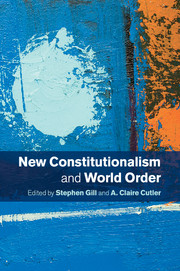Book contents
- Frontmatter
- Contents
- List of Figures
- List of Contributors
- Acknowledgements
- List of Acronyms
- 1 New constitutionalism and world order
- Part I Concepts
- Part II Genealogy, origins and world order
- Part III Multilevel governance and neo-liberalization
- Part IV Trade, investment and taxation
- Part V Social reproduction, welfare and ecology
- 13 Social reproduction, fiscal space and remaking the real constitution
- 14 New constitutionalism, disciplinary neo-liberalism and the locking in of indebtedness in America
- 15 New constitutionalism, neo-liberalism and social policy
- 16 New constitutionalism and the environment
- Part VI Globalization from below and prospects for a just new constitutionalism
- Glossary
- Appendix
- Bibliography
- Index
15 - New constitutionalism, neo-liberalism and social policy
from Part V - Social reproduction, welfare and ecology
Published online by Cambridge University Press: 05 February 2014
- Frontmatter
- Contents
- List of Figures
- List of Contributors
- Acknowledgements
- List of Acronyms
- 1 New constitutionalism and world order
- Part I Concepts
- Part II Genealogy, origins and world order
- Part III Multilevel governance and neo-liberalization
- Part IV Trade, investment and taxation
- Part V Social reproduction, welfare and ecology
- 13 Social reproduction, fiscal space and remaking the real constitution
- 14 New constitutionalism, disciplinary neo-liberalism and the locking in of indebtedness in America
- 15 New constitutionalism, neo-liberalism and social policy
- 16 New constitutionalism and the environment
- Part VI Globalization from below and prospects for a just new constitutionalism
- Glossary
- Appendix
- Bibliography
- Index
Summary
Introduction
In the early 1990s Stephen Gill introduced the terms ‘new constitutionalism’, ‘disciplinary neo-liberalism’ and ‘market civilization’ into the lexicon of international political economy. These conceptual benchmarks have occupied persuasive ground in an ongoing debate about the character, coherence and consequences of neo-liberal governing ideas in contemporary international and national politics. An early and influential participant in this debate, Gill’s conceptual troika helped to demystify and denaturalize economic globalization, depicting it instead as a resolutely political project aimed at establishing ‘transnational liberalism, and if possible liberal democratic capitalism, [as] the sole model for future development’ (2003: 132; see also 1995a). Gill’s portrayal of the new constitutionalism projected a new transnational governing order enforced through the binding decrees of transnational legal instruments, trade agreements and international financial institutions. This new constitutional order disciplined national states to protect and extend property rights and to insulate key aspects of national economies from democratic accountability (2003: 132). Although the new constitutionalism was transnational in scope, Gill also understood disciplinary neo-liberalism as having micro dimensions because its capillaries stretched down into organizational and individual behaviour, progressively imposing the imperatives of the global market on everyday life (Griffiths et al. 2009: 181).
- Type
- Chapter
- Information
- New Constitutionalism and World Order , pp. 247 - 260Publisher: Cambridge University PressPrint publication year: 2014
- 2
- Cited by

